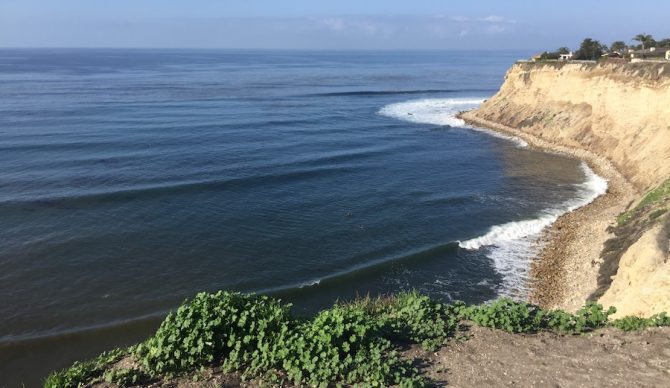
A judge’s ruling has changed the classification of “localism.” And municipalities could be held liable for letting it happen. Photo: Dylan Heyden
Any surfer could have missed it, probably because most surfers don’t spend much time perusing MissoulaCurrent.com, a Montana-based news site where one goes for updates on the Montana Department of Fish, Wildlife and Parks new development plans for Fish Creek and the results of the Snowbowl Gelandesprung Championships, a “terrain jumping” ski event won this year by Steamboat Springs, Colorado’s Marsh Gooding. Not exactly the site where’d you expect to see this sort of headline: Court Revives Lawsuit Over Cal Surf Gang Lunada Bay Boys. But there it was, a March 1 feature story about a very interesting development in surf culture, the likes of which couldn’t be found on any of the region in question’s local news organizations. Odd, that.
So here’s the scoop. A California appeals court has reopened a suit stemming from a 2016 case (see video, below), in which two non-local SoCal surfers — former LAPD cop Cory Spencer and Malibu model/filmmaker Diana Milena Miernik — sought legal action against Palos Verdes, California’s notorious “Lunada Bay Boys,” charging that the verbal threats, intimidation and even physical violence employed by these PV locals to keep outsiders from enjoying their affluent neighborhood’s surf spot fits the categorization of “criminal street gang.” The suit also named city of Palos Verdes Estates as being complicit to the Bay Boy’s decade’s long campaign of intimidation, asserting that the continued existence of the rock “fort” that the area’s trust fund surf punks had erected and used as a formidable barrier from which to hurl rocks and epithets at clueless interlopers represented an un-permitted coastal development.
Although publicity surrounding the 2016 suit led the California Coastal Commission to hastily have the Bay Boy’s rock fort demolished, the pair’s lawsuit was eventually dismissed by a federal judge in 2018. Undeterred, the two non-locals pressed on, filing their case in state court, where the result was different, and in light of the settlement, delightfully whimsical: 12 of the Lunada Bay Boys were banned from their precious local spot for a year. In 2020, however, a state court judge dismissed the case against Palos Verdes Estates, citing that allowing Lunada Bay’s rock fort to remain for 30 years did not constitute a violation of the 1976 California Coastal Act, which sets parameters for all coastal development projects, with the exact definition of the term “development” proving to be the sticking point for the plaintiffs.
Ok, now the fun part. Writing for the panel on March 1 of this year, Second Appellate District Presiding Justice Laurence Rubin surmised that the plaintiffs had, “sufficiently alleged an actionable conspiracy in which the city has participated,” and overruled the trial court decision that dismissed Palos Verdes estates from the previous suit. Why? Because though apparently the Coastal Act considers development rather broadly, it does include this language in its definition: “…a change in the intensity of use of water or of access thereof.” Which should be of considerable interest to any surfer whose ever been verbally or physically intimidated by so-called “locals.”
Can it get any more intense than having your access to a public beach like Lunada Bay denied by a resident group of affluent, rock-throwing local enforcers? Justice Rubin doesn’t think so, writing, “We conclude a change in the access to water brought about by an organized scheme of harassment of, or similar impediment imposed on, those seeking access may be just as much a change in access to water as one brought about by a physical impediment. Accordingly, as the harassment and other conduct alleged here directly interferes with, and sometimes precludes, access to the Pacific Ocean, it can be seen to fall within the statute.”
In short, in reviving the suit against Palos Verdes Estates, Justice Rubin is asserting that under California law “localism,” at least as we’ve come to know it, is illegal, and that cities that allow it to exist can be held liable in court. And as such, Spencer and Milena Miernik’s lawsuit against Palos Verdes Estates can proceed.
Now, I know there are more than a few surfers out there who claim to miss the good ‘ol days, when the righteous could slash the tires or punch out “non-locals” without the threat of legal repercussions; the haze of nostalgia pointing to that as a better time for surfing. Oh, yeah, those were the days, they’ll say. But I’ll tell you this, there are vastly more surfers out there who’ve had their access to water impeded by so-called “locals” than have done the impeding, myself included. So I’ll be keeping my eye on how this new court case turns out, if for no other reason than to see which side of surf history we’ll all be standing on when the verdict is read.
Editor’s Note: In 2016 Chase Scheinbaum, a writer for The Inertia, surfed the notoriously localized Lunada Bay as an outsider. This is what happened.

